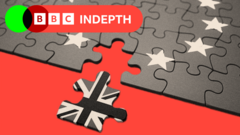Following the recent electoral success of the Labour government, the UK is set to engage in significant discussions with the EU, focusing on a potential security pact and trade reforms that could reshape post-Brexit relationships. This summit, viewed through various political lenses as a pivotal point, raises questions about the UK's future stance toward EU collaboration amid fears of “surrender” or excitement about emerging partnerships.
Britain’s Reconnection: Steps Towards Renewed Relations with the EU

Britain’s Reconnection: Steps Towards Renewed Relations with the EU
As the UK prepares for its first major summit with the EU since Brexit, political tensions and opportunities abound regarding security, trade, and immigration policies.
On a sunny morning earlier this month, London’s Lancaster House served as the backdrop for a significant gathering of European political leaders and UK officials, led by Foreign Secretary David Lammy. This meeting framed a prospective shift in UK-EU relations, with key discussions surrounding the ongoing war in Ukraine, security, and a landmark summit between the UK and EU scheduled for May 19.
Historically, before Brexit, British prime ministers would frequently meet with EU counterparts for high-stakes negotiations. Now, the revived Labour government aims to re-establish consistent dialogue with Europe, marking a potential departure from previous tactics. Sir Keir Starmer's team intends to solidify a "partnership" with top EU officials, a move that polarizes opinions across the political spectrum.
While some suggest it reflects a capitulation to Brussels—a “surrender summit”—others perceive it as a pragmatic step toward building necessary relationships. This particularly relates to defense cooperation, as discussions about a Security and Defence Partnership emerge, representing a departure from the UK’s previously divergent stance from EU defense initiatives.
EU foreign policy chief Kaja Kallas emphasizes the need to advance the partnership due to contemporary global challenges, despite past disagreements. Critics within UK politics counter that reliance on NATO remains sufficient, arguing that any such agreements may dilute defense sovereignty.
Moreover, prospects for a 'veterinary' deal have raised eyebrows. The UK aims to minimize border checks on food and drink, tackling practical trade challenges faced by businesses post-Brexit. Advocates in the food industry, like Julianne Ponan, believe this could significantly ease the trading process, particularly for regional exporters concerned about bureaucratic hurdles.
However, any such deal could require aligning UK standards with EU regulations—a prospect that stirs controversy, as it might suggest an erosion of independence, undermining the “take back control” ethos championed during the Brexit campaign.
The summit's outcome may not drastically alter the UK's standing within Europe, as defense collaboration and trade negotiations have remained ongoing since the conflict with Ukraine escalated. Industry experts, including Kevin Craven from ADS Group, argue that a security pact could bolster the UK's economic interests and military contributions.
Opposing views express skepticism regarding the depth of these negotiations. Jill Rutter, a senior fellow at UK in a Changing Europe, argues that existing ties have already strengthened, while critics from Reform UK predict a "great British sellout," warning against any inclination toward EU convergence.
Trade in fishing rights remains another contentious issue, with British fishermen previously expressing dissatisfaction at concessions made under Johnson's administration. As the EU seeks to renew these arrangements, negotiations are bound to be fraught with complexity.
Additionally, recent discussions surrounding a youth mobility initiative could reshape migration dynamics. Supporters contend that a limited scheme enabling UK and EU nationals under 30 to work together could foster greater understanding and connections, provided it does not inflate immigration numbers.
This upcoming political rendezvous at Lancaster House represents both hope and contention, amidst aspirations of mending ties and addressing trade challenges. As the parties prepare for engaging dialogue, the consequences of these discussions will undoubtedly shape the UK’s relationship with Europe in the years to come.






















